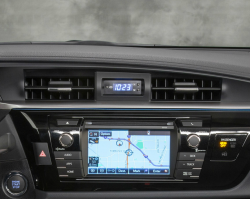
— A Toyota air conditioner smell lawsuit alleges numerous Toyota and Lexus models build up mold on the evaporators and send musty moldy odors into the vehicles.
The proposed class-action lawsuit includes all customers in the U.S. who purchased or leased any of the following Toyota or Lexus vehicles.
- 2010-2015 Toyota 4Runner
- 2007-2015 Toyota Avalon
- 2013-2015 Toyota Avalon HV
- 2009-2015 Toyota Corolla
- 2008-2015 Toyota Highlander
- 2008-2015 Toyota Highlander HV
- 2008-2015 Toyota Land Cruiser
- 2009-2015 Toyota Matrix
- 2006-2015 Toyota Prius
- 2012-2015 Toyota Prius C
- 2010-2015 Toyota Prius PHV
- 2012-2015 Toyota Prius V
- 2006-2015 Toyota RAV4
- 2008-2015 Toyota Sequoia
- 2004-2015 Toyota Sienna
- 2007-2015 Toyota Tundra
- 2009-2015 Toyota Venza
- 2007-2015 Toyota Yaris
- 2007-2014 Toyota FJ Cruiser
- 2013-2014 Lexus GS 350/450h
- 2014 Lexus IS 250/350
- 2011-2014 Lexus CT 200h
- 2007-2014 Lexus ES 350
- 2013-2014 Lexus ES 300h
- 2006-2011 Lexus GS 300/350/430/450h/460
- 2010-2014 Lexus GX 460
- 2010-2012 Lexus HS 250h
- 2006-2013 Lexus IS 250/350
- 2010-2014 Lexus IS 250C/350C
- 2008-2014 Lexus IS F
- 2012 Lexus LFA
- 2007-2014 Lexus LS 460
- 2008-2014 Lexus LS 600h
- 2008-2014 Lexus LX 570
- 2010-2014 Lexus RX 350/450h
- 2006-2009 Lexus GX 470
- 2007-2009 Lexus RX 350
- 2006-2008 Lexus RX 450h
The plaintiffs claim the vehicles have defective heating, ventilation and air conditioning (HVAC) systems that cause smells and health problems from mold that collects on the evaporators. Numerous complaints have allegedly been filed with the government, Toyota and Lexus dealerships nationwide since at least 1999.
The air conditioner smell lawsuit also alleges Toyota has issued multiple technical service bulletins (TSBs) to dealers since 1997, admitting the odors exist but telling dealers there are allegedly no methods to get rid of the smells.
According to the lawsuit, Toyota created a manual called "Toyota Air Conditioning and Climate Control Course 752" about the air conditioning systems, and the manual admits the smells “are a common complaint among users” and “there is no permanent mechanical repair” for the odors.
Toyota blames the smells on “[m]icrobes [i.e., mold] growing on the evaporator surface” including “small living bacteria . . . carried into the evaporator case [that] grow in the warm, moist environment."
In addition to the moldy musty odors and possible health consequences, the plaintiffs claim the airbag modules are damaged when water leaks onto the modules from the HVAC systems. Damage to the modules can cause illuminated airbag warning lights, airbag failures or inadvertent airbag deployments.
Toyota dealers have been issued TSBs about the moldy smells, something the plaintiffs claim shows the automaker has known about the smells for a long time.
In May 1997, Toyota sent dealerships TSB AC002-97 that told technicians about customers complaining of musty odors coming from the air conditioners. The bulletin said the smells could arise from blocked evaporator housing drain pipes that cause condensation on the systems.
In August 2009, Toyota issued bulletin T-SB-0261-09 concerning smells in certain Camry, Camry HV and Prius cars. The TSB said the automaker had created a new evaporator sub-assembly to "decrease the potential for HVAC odor.”
The TSB was updated in November 2011, then another bulletin was issued to Toyota and Lexus dealers in September 2013 titled “HVAC Odor Maintenance,” but the bulletin admitted there was no way to eliminate the smells.
Toyota has repaired some of the affected vehicles due to customer complaints, but the lawsuit alleges the repairs consist of replacing air filters or using other repair methods that fail to fix the mold and smell problems.
As for what is causing the alleged problem, the lawsuit says the air conditioner systems don't properly remove water from the evaporators and from the enclosures that contain the evaporators. Mold and other contaminants grow on the evaporators and are sent into the passenger cabins by the blowers.
The Toyota air conditioner smell lawsuit was filed in the U.S. District Court for the Central District of California - Stockinger, et al., v. Toyota Motor Sales, U.S.A., Inc.
The plaintiffs are represented by Kessler Topaz Meltzer & Check, LLP, and Kiesel Law.




